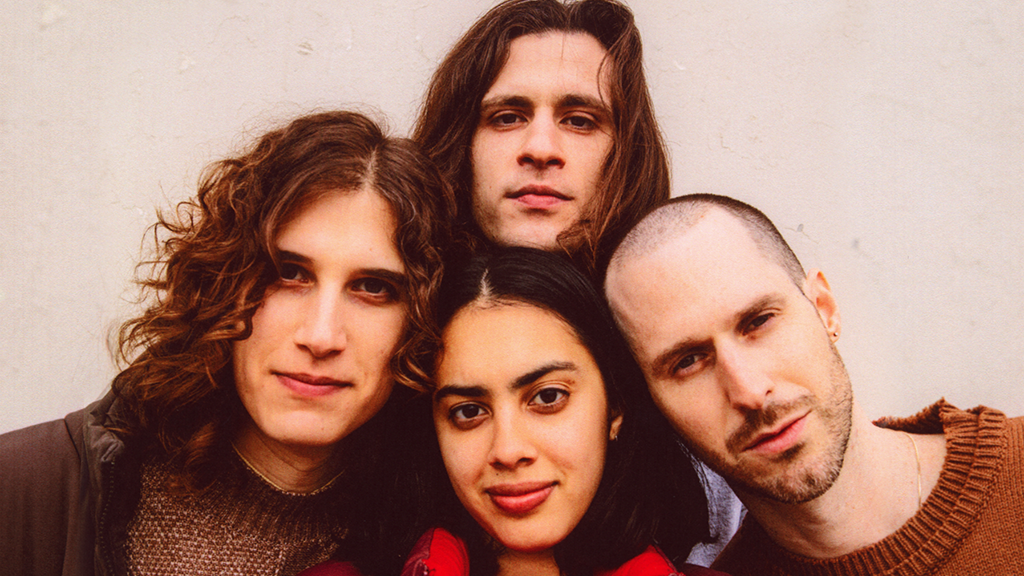
This event is all ages.
Tickets starting at $50.60 ($35.00 + $15.60 fees)
For an additional $60.00, you can opt in to upgrade your experience to include access to the exclusive Telegraph Room before, during and after the show! Please note all Telegraph Room upgrades are subject to availability.
Join us at The Den one hour before doors for food & drinks!
All doors & show times subject to change.
Crumb
New York psych-pop band Crumb return with AMAMA, their most carefree and open-hearted album to date. A soundscape full of playful and patchwork experimentation — glitchy pitch-shifted vocals, cell phone recordings, nautical blips, sax mouthpiece solos, blasted drum samples, and piano strings dampened with Silly Putty — AMAMA continues to deepen the band’s hypnotic sound in a cohesive line back through 2021’s Ice Melt, 2019’s Jinx, and breakout EPs Locket and Crumb. Without a doubt, AMAMA is Crumb — singer and multi-instrumentalist Lila Ramani, keyboardist and saxophonist Bri Aronow, bassist Jesse Brotter, and drummer Jonathan Gilad — at their most animated.
Buoyed by Ramani’s songwriting, at turns poetically abstract and directly confessional, AMAMA culls the strange encounters from Crumb’s touring years, tracing the dizzying path of a group that’s been in movement for nearly a decade. “Crushxd” is an ecstatic requiem for a turtle flattened under the tires of a tour van; “(Alone in) Brussels” finds Ramani in forced isolation in a distant city. On “The Bug,” we’re at a pit stop in a seedy motel, where a critter’s bite leaves a nagging feeling: “It’s always on my mind / it’s just always on my mind,” Ramani repeats over a creeping groove as she wanders the place at night. On “Side by Side,” perhaps the most candid track on AMAMA, frenetic percussion and disorienting, layered synth envelop Ramani as she considers the personal sacrifices she’s made along the way.
Even as it explores transient stops and fraught encounters, AMAMA features some of Crumb’s most vulnerable, tender searches for organic connection. “Home is what I want and what I need,” Ramani sings on the clear-sighted opener, “From Outside a Window Sill”—which samples a police radio scan about a flock of geese crossing a bridge in Gowanus, Brooklyn, where Ramani grew up. The title track, “AMAMA,” is an upbeat and hopeful homage to Ramani’s grandmother, her namesake, who sings in Malayalam in the opening sample. The two voices, Lila’s and Leela’s, separated by language and place, intertwine as if on a spotty long-distance call in what is the most direct love song of Crumb’s repertoire. On the album’s closer, “XXX,” laden with distorted, industrial sounds, we finally find respite—a house shared between two lovers, a safe place. In the last moments, Ramani asks: “Isn’t this as good as it can get?”
AMAMA exists at the crossroads of psychedelia, pop, jazz, and rock, and cements Crumb as a band uniquely their own. Released independently on Crumb Records and produced alongside Johnscott Sanford and Jonathan Rado in Los Angeles, AMAMA is an incandescent statement about searching for solid ground, connection, and clarity in a life of nomadic upheaval.
Vagabon
“I didn’t feel like being introspective,” says Laetitia Tamko of her playful and adventurous new album Sorry I Haven’t Called. “I just wanted to have fun.” As Vagabon, Tamko is no stranger to reinvention. Following her intimate 2017 debut Infinite Worlds, the New York artist favored expansive and evocative electronic textures in her breakthrough 2019 self-titled follow-up. But her latest LP, which is out September 15 via Nonesuch, feels like a wholly new era for Tamko, one that’s transformational and uncompromising. Across 12 vibrant tracks she wrote and produced primarily in Germany, she channels dance music and effervescent pop through her own confident sensibilities. These conversational songs are alive and unselfconscious, a document of an artist fully embracing her vision and reclaiming her joy.
